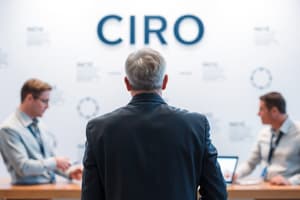Podcast
Questions and Answers
What is a common strategy for implementing a policy change effectively?
What is a common strategy for implementing a policy change effectively?
- Absence of management approval for changes
- Immediate full implementation across all regions
- Open-ended discussions without a set plan
- Phased implementation followed by comprehensive training (correct)
Which of the following is essential for ensuring effective policy implementation?
Which of the following is essential for ensuring effective policy implementation?
- Implementing policies immediately to avoid confusion
- Avoiding management involvement for unbiased training
- Spontaneous employee feedback without structured training
- Involvement of compliance departments in training (correct)
What is an important first step prior to implementing significant policy changes?
What is an important first step prior to implementing significant policy changes?
- Rolling out the policy without any prior announcement
- Conducting compliance tasks without training sessions
- Discussing changes openly with all employees
- Obtaining approval from executive management or the board (correct)
How should organizations prepare staff for new regulatory compliance policies?
How should organizations prepare staff for new regulatory compliance policies?
What might be a consequence of a policy change affecting outside parties?
What might be a consequence of a policy change affecting outside parties?
Why is executive endorsement important when announcing new policies?
Why is executive endorsement important when announcing new policies?
What is a primary focus of quality control in the context of policy change implementation?
What is a primary focus of quality control in the context of policy change implementation?
What type of training is often mandated by regulations for compliance-related policies?
What type of training is often mandated by regulations for compliance-related policies?
What is the primary purpose of establishing policies and procedures within a firm?
What is the primary purpose of establishing policies and procedures within a firm?
Which factor is essential for understanding and developing a firm's policies and procedures?
Which factor is essential for understanding and developing a firm's policies and procedures?
What consequence can a dealer member face if policies and procedures are not followed?
What consequence can a dealer member face if policies and procedures are not followed?
How should dealer members ensure the adequacy of their policies and procedures?
How should dealer members ensure the adequacy of their policies and procedures?
What is a common deficiency observed among firms regarding their policies?
What is a common deficiency observed among firms regarding their policies?
In the context of policy writing, what should compliance staff be prepared to provide?
In the context of policy writing, what should compliance staff be prepared to provide?
Which approach can a dealer member take regarding its policies and procedures compared to industry rules?
Which approach can a dealer member take regarding its policies and procedures compared to industry rules?
What role does client protection play in the development of policies and procedures?
What role does client protection play in the development of policies and procedures?
What is the primary goal of having written policies and procedures for dealer members?
What is the primary goal of having written policies and procedures for dealer members?
Which of the following is NOT mentioned as a key element to consider when developing a policy or procedure?
Which of the following is NOT mentioned as a key element to consider when developing a policy or procedure?
Who typically approves all policies related to securities regulatory requirements?
Who typically approves all policies related to securities regulatory requirements?
How should dealer members handle amendments to their written policies and procedures?
How should dealer members handle amendments to their written policies and procedures?
What responsibility does the Chief Compliance Officer (CCO) have regarding policy development within the organization?
What responsibility does the Chief Compliance Officer (CCO) have regarding policy development within the organization?
What must each employee and Approved Person understand regarding the dealer member's written policies?
What must each employee and Approved Person understand regarding the dealer member's written policies?
What aspect of policies ensures they remain relevant and effective?
What aspect of policies ensures they remain relevant and effective?
When considering document retention policies, which statement is accurate?
When considering document retention policies, which statement is accurate?
Flashcards are hidden until you start studying
Study Notes
Key Principles in Developing Policies and Procedures
- Essential for cultivating a culture of compliance within dealer members.
- Clearly written and communicated policies establish compliance and performance standards.
- Compliance staff must clarify the reasoning behind rules and regulations to aid understanding among registrants.
- Policies can exceed industry standards but require comprehension of the underlying rules.
- Protecting client interests is a crucial aspect, as failing to comply can lead to adverse client actions against the firm.
- Common deficiencies include outdated or poorly documented policies, contributing to regulatory challenges.
Regulatory Requirements for Policies and Procedures
- CIRO mandates that dealer members maintain written policies to ensure compliance with securities regulations.
- Policies must provide reasonable assurance of compliance from both the dealer member and its employees.
- Ongoing updates and adjustments to policies are critical in response to regulatory changes.
- Implementation of some policies may be phased or pilot-tested in specific regions.
- Training and education are vital for mandatory compliance areas, such as anti-money laundering and privacy.
- New significant policies require executive and sometimes board approval before implementation.
Developing and Amending Policies and Procedures
- The process for policies and procedures is procedural itself and requires addressing multiple considerations.
- Key questions include necessity, affected parties, staffing and IT needs, training requirements, financial implications, risks of inaction, and alternatives.
- Policies continually evolve, reflecting industry changes and regulatory developments.
- The Chief Compliance Officer (CCO) is involved in the approval of policies concerning regulatory requirements, while others may fall under different departmental authorities.
- Document retention obligations extend to all forms of communication, including electronic mail.
Studying That Suits You
Use AI to generate personalized quizzes and flashcards to suit your learning preferences.



